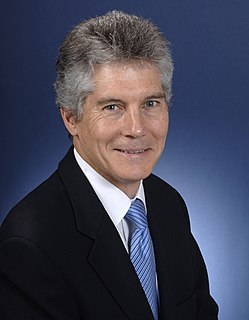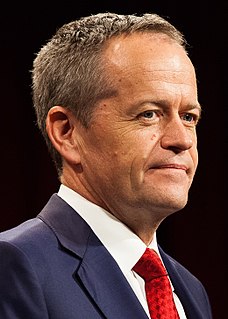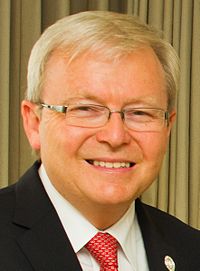
Simon Findlay Crean is an Australian politician and trade unionist. He was the Member of Parliament for Hotham from 1990 to 2013, representing the Labor Party, and served as a Cabinet Minister in the Hawke, Keating, Rudd and Gillard Governments. He was the Leader of the Labor Party and Leader of the Opposition from November 2001 to December 2003.

Kevin Michael Rudd is an Australian Labor Party politician who was the 26th Prime Minister of Australia, serving twice, from December 2007 to June 2010 and again from June 2013 to September 2013.

Julia Eileen Gillard is an Australian politician who served as the 27th Prime Minister of Australia and Leader of the Labor Party from 2010 to 2013, the first and only woman to date to hold either role. She previously held the roles of Deputy Prime Minister of Australia, Minister for Education, Minister for Employment and Workplace Relations and Minister for Social Inclusion from 2007 to 2010.

Anthony John Abbott is an Australian former politician who served as the 28th Prime Minister of Australia from 2013 to 2015 and leader of the Liberal Party from 2009 to 2015. He served as Leader of the Opposition from 2009 to 2013, and as Member of Parliament (MP) for Warringah from 1994 to 2019. He is currently an adviser to the British government's Board of Trade.

Anthony Norman Albanese is an Australian politician serving as Leader of the Opposition and leader of the Australian Labor Party (ALP) since 2019. He has been Member of Parliament (MP) for Grayndler since 1996. Albanese was Deputy Prime Minister of Australia in 2013 and a Cabinet Minister in the Rudd and Gillard Governments from 2007 to 2013.

Stephen Francis Smith is a former Australian politician who was a member of the House of Representatives from 1993 to 2013. He served as a minister in the Rudd and Gillard Governments, including as Minister for Foreign Affairs (2007–2010), Minister for Trade (2010), and Minister for Defence (2010–2013).

Joseph William Ludwig is an Australian barrister and retired politician. He was a member of the Australian Senate for the state of Queensland from July 1999 to May 2016, representing the Australian Labor Party. Ludwig served in a range of portfolios in the first Rudd and the second Gillard ministries until his resignation from Cabinet as the Minister for Agriculture, Fisheries and Forestry and Minister Assisting the Attorney-General on Queensland Floods Recovery, in 2013.

William Richard Shorten is an Australian politician who served as Leader of the Opposition and Leader of the Labor Party from 2013 to 2019. Shorten was first elected as the Member of Parliament (MP) for Maribyrnong in 2007, and was a Cabinet Minister in the Gillard and Rudd Governments from 2010 to 2013.
Faceless men is a term from Australian politics. The term is generally used to refer to men and women who exert political influence and are not elected representatives to state, territory or federal legislative bodies, yet are elected representatives to bodies that determine political party policies. However, the political tactic of elected representatives canvassing party members for support on policies varies widely amongst Australian political parties.

In Australian politics, a leadership spill is a declaration that the leadership of a parliamentary party is vacant and open for re-election. A spill may involve all leadership positions, or just the leader. Where a rival to the existing leader calls for a spill, it may also be called a leadership challenge.

The Rudd Government (2007–2010) was the executive government of Australia formed by the Australian Labor Party (ALP) and led by Prime Minister Kevin Rudd. The Rudd Government commenced on 3 December 2007, when Rudd was sworn in along with his ministry. This took place just nine days after the defeat of the Howard Government, which was a Coalition of members of the Liberal and National parties, at the 2007 federal election. The Rudd Government concluded on 24 June 2010 when Rudd, under pressure from an impending leadership caucus ballot, stepped down from the leadership of the ALP and was succeeded by his deputy, Julia Gillard. Rudd was re-elected leader of the Labor Party in 2013 and served a second term as prime minister.

A leadership spill occurred in the Australian Labor Party on 24 June 2010. Kevin Rudd, the Prime Minister of Australia, was challenged by Julia Gillard, the Deputy Prime Minister of Australia, for the leadership of the Australian Labor Party. Gillard won the election unopposed after Rudd declined to contest, choosing instead to resign. Gillard was duly sworn in as prime minister by Quentin Bryce, the Governor-General, on 24 June 2010 at Government House, becoming Australia's first female prime minister.

The Gillard Government was the Government of Australia led by the 27th Prime Minister of Australia, Julia Gillard, of the Australian Labor Party. The Gillard Government succeeded the First Rudd Government by way of the Labor Party leadership spill, and began on 24 June 2010, with Gillard sworn in as Prime Minister by the Governor-General of Australia, Quentin Bryce. The Gillard Government ended when Kevin Rudd won back the leadership of the Australian Labor Party on 26 June 2013 and commenced the Second Rudd Government.

The 2013 Australianfederal election to elect the members of the 44th Parliament of Australia took place on 7 September 2013. The centre-right Liberal/National Coalition opposition led by Opposition leader Tony Abbott of the Liberal Party of Australia and Coalition partner the National Party of Australia, led by Warren Truss, defeated the incumbent centre-left Labor Party government of Prime Minister Kevin Rudd by an 18-seat 3.6 percentage point two-party swing resulting in a landslide win for the Coalition. Labor had been in government for 6 years since first being elected in the 2007 election. This election marked the end of the 6-year Rudd-Gillard-Rudd Labor government and the start of the current Abbott-Turnbull-Morrison Liberal-National Coalition government. Abbott was sworn in by the Governor-General, Quentin Bryce, as Australia's new Prime Minister on 18 September 2013, along with the Abbott Ministry and the members of the House of Representatives. The 44th Parliament of Australia opened on 12 November 2013, which is taken to be the commencement of the term of members of the House of Representatives. The new senators were sworn in by the next Governor-General Peter Cosgrove on 7 July 2014, with their six-year terms commencing on 1 July.

The Clean Energy Act 2011 was an Act of the Australian Parliament, the main Act in a package of legislation that established an Australian emissions trading scheme (ETS), to be preceded by a three-year period of fixed carbon pricing in Australia designed to reduce carbon dioxide emissions as part of efforts to combat global warming.

A leadership spill in the Australian Labor Party, the party of government in the Parliament of Australia, was held on 27 February 2012 at 10 am AEDT, followed by a ballot. The Prime Minister, Julia Gillard, announced the spill at a press conference on 23 February 2012, following the resignation of the Minister for Foreign Affairs, Kevin Rudd, from his cabinet position after months of speculation that he intended to challenge Gillard for the leadership. Rudd announced his intention to seek the leadership at a press conference on 24 February.

A leadership spill in the Australian Labor Party, the party of government in the Parliament of Australia, was held on 21 March 2013. Prime Minister Julia Gillard called a ballot for the Leadership and Deputy Leadership of the Labor Party for 4.30pm, following a press conference by former Labor Leader and Regional Minister Simon Crean over persistent leadership tensions. At the caucus meeting, no alternative candidates nominated for the positions, and so Gillard and Wayne Swan were re-elected unopposed.

A leadership spill in the Australian Labor Party, the party then forming the Government of Australia, took place on 26 June 2013 at 7:00pm AEST. Prime Minister Julia Gillard called a ballot for Leader and Deputy Leader of the Labor Party live on Sky News Australia at 4:00pm, following persistent leadership tensions. She stated that she would retire from politics if she lost the vote, while calling on any would-be challengers to pledge to do the same if they lost. In a press conference held shortly after Gillard's announcement, backbencher and former Prime Minister Kevin Rudd announced that he would challenge Gillard, whilst also pledging to step down if he did not win the vote. At the ALP caucus meeting, Rudd was elected Leader of the Labor Party, with the caucus voting 57–45 in his favour.

The Second Rudd Ministry (Labor) was the 67th ministry of the Australian government, led by Prime Minister Kevin Rudd. It succeeded the second Gillard ministry after a leadership spill within the Australian Labor Party that took place on 26 June 2013. Three members of the ministry were sworn in by Governor-General Quentin Bryce on 27 June 2013. These were Kevin Rudd, Prime Minister; Anthony Albanese, Deputy Prime Minister; and Chris Bowen, Treasurer. The remainder of the ministry were sworn in on 1 July 2013.

A leadership election was held in October 2013 to select Kevin Rudd's replacement as leader of the Australian Labor Party and Leader of the Opposition. Bill Shorten was elected party leader, and Tanya Plibersek was later confirmed as deputy leader.



















